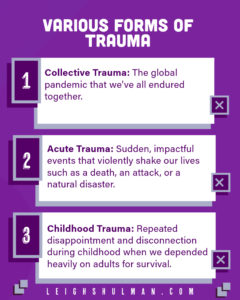The word “trauma” has become a buzzword in our world. While the constant repetition may begin to lose meaning, its relevance cannot be denied. We are, in fact, living in the middle of a series of traumas.
Whether it’s the individual trauma of a personal tragedy or the collective trauma of a pandemic, its effects are undeniable. As writers, it can be especially challenging to navigate these experiences and find our creative voices amidst the chaos.
But here’s the thing – we are not defined by our trauma. Instead, we have the ability to transform our pain into purpose and fuel for growth.
In this article, I’ll share insights about the different forms of trauma and how your painful experiences make you a more sensitive and expansive writer.
Various Forms of Trauma
Understanding the diverse nature of trauma is key to navigating and transforming it. Let’s dive deeper into the specific types of trauma that may be impacting your writing journey. Each form of trauma carries unique challenges, yet recognizing and addressing them can be the catalyst for immense personal and creative growth.
- Collective Trauma: The global pandemic that we’ve all endured together.
- Acute Trauma: Sudden, impactful events that violently shake our lives such as a death, an attack, or a natural disaster.
- Childhood Trauma: Repeated disappointment and disconnection during childhood when we depended heavily on adults for survival.
This trauma we experience as children impacts the way we connect with other people. This is a brief and simplified explanation of attachment theory, another trending term related to understanding relational trauma theory.
Relational Trauma and Its Manifestations
Therapist and author Ingrid Clayton talks about how feeling shock is a sign that we’re experiencing relational trauma in two different ways.
- We’re shocked when others repeat the same negative behavior they’ve habitually demonstrated.
- We’re taken aback when someone hints at our deserving of good things or when we attribute our successes to luck instead of our worthiness.
The impact of this relational trauma is evident in writers when they undervalue their ideas, shy away from demanding what they want, and let rejection hinder them from taking risks. However, it’s possible to modulate this self-critical voice—we can grow, achieve the seemingly impossible, and then move on to overcome more impossibilities.
Taking Accountability and Forging a Better Path
Holding oneself accountable for words and actions requires introspection and acceptance of a need for change.
In my BOOKShelf author series, Ingrid Clayton beautifully captured this sentiment in her book “Believing Me: Healing From Narcissistic Abuse and Complex Trauma” Her profound insights have inspired many to uncover their life patterns and chase their dreams with a newfound zeal.
Somatic Experience Therapy: A New Approach Toward Healing
Intrigued by Clayton’s discussion, I delved into Somatic Experience Therapy, which she mentions in her book. It challenges the trauma not through the mind and words but through the body. The therapy is centered around the SIBAM channels—Sensation, Imagery, Behavior, Affect (emotion), and Meaning (our stories).
Particularly interesting is how “Meaning” relates to our stories and how these stories can both facilitate and hinder our writing. It’s through the other channels that we find an escape from the self-deprecating narratives.
The Power of Sensation and Imagery in Writing
Engaging with our feelings and senses, such as the chill of a breeze or a knot in the stomach, can not only help us understand our own trauma and negative self-talk but also add depth to our writing.
Storytelling requires a setting and atmospheric tone, which infuse richness into a story’s arc and its protagonists. By being aware of the senses, emotions, and imagery of your story, you significantly deepen your reader’s connection with your characters.
When you venture to explore your own story and internal emotional state, you add a deeper dimension to your drive to write and share your writing with the world.
Enhance Your Writing with The Inspired Writer Community
These are the techniques I use in my writing and also share with The Inspired Writer Community members. We discuss writing while also focusing on self-care and cultivating the mindset that propels us to accomplish more and grow.
Ultimately, we’re all here in this community to grow and strive toward our writing dreams.


